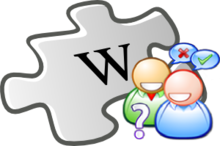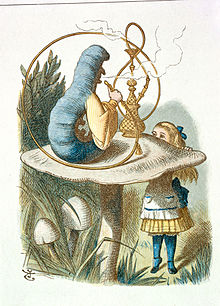Wikipedia:Guidance for younger editors
This is an essay. It contains the advice or opinions of one or more Wikipedia contributors. This page is not an encyclopedia article, nor is it one of Wikipedia's policies or guidelines, as it has not been thoroughly vetted by the community. Some essays represent widespread norms; others only represent minority viewpoints. |
personal information (e.g. name, age, location, school, IP address etc.) on the Internet – even to people that you think you know in real life.
If you suspect a minor has posted their personal information on Wikipedia, use Wikipedia:Requests for oversight. |
This page in a nutshell: Welcome to Wikipedia!
|
Did you know you can edit Wikipedia? You don't have to be a certain age to edit! All you have to do is to follow some rules. The most important thing is to write good accurate information, add reliable sources, and work nicely with others. Here are some helpful tips for editing Wikipedia.
Adults can read Wikipedia:Advice for parents as well.
Keeping yourself safe
Basics
- Be careful with what you write. Never give your name, address, phone number, location, or other personal information. Dangerous people can find out your true identity with it!
- Do not edit articles that are closely related to you, such as your school's article, or any articles related to your location and where you live.
- Do not write articles about yourself. If you are a very important person (or what we refer to as a notable person), someone else will write an article about you.
- If you've posted your personal information, request it to be 100% deleted immediately. This will hide that information, and not allow anyone to see or access it.
- Never upload or post photos of yourself, your friends, or your family. People can easily use those images to find your true identity. While you may really like your picture in front of the Eiffel Tower, readers just want to see the Eiffel Tower. If there is a photo that has you in it, don't mention it!
Account
- If you don't have an account for yourself, create one!
- Always log into your account and use it when you contribute to Wikipedia. By doing this, your edits will be attributed to your username rather than your IP address.
- Use a strong password and never share it with anyone.
- Do not share your account or allow anyone else to use it.
- When you leave your computer, log out of your account - especially if you're on a public computer or one that you share with others.
- Do not good reason.
Getting help

There are plenty of other editors ready to help you.
- For general help. If you need to know how to do something, go to the Wikipedia:Teahouse to get help.
- Urgent help. If you need to speak to an experienced editor quick, use this tool.
- Personal information. If you have posted personal information, go to Wikipedia:Requests for oversight.
How can you contribute to Wikipedia?
Pretty much just like anyone else – mostly by improving articles and writing new ones.
- If you write a new article that really belongs here, you have made our encyclopedia better! Many new articles are deleted because people don't know what should and should not be in an encyclopedia, and the place to find out is at What Wikipedia is not. If your work gets deleted, please don't be disappointed or take it personally: many of our best editors have had some of their articles deleted.
- Help clean up. Because it's easy to edit the encyclopedia, some people think it's funny to do silly things to it. We don't think it's funny, and we call it vandalism. If you see something that is very silly or rude and shouldn't be here, you can go ahead and remove it.
- Wikipedia isn't like "Wiki-coding"works.
- Have fun. Do what you enjoy and what you are good at. All of us, of whatever age, work on Wikipedia because we like spending our free time doing it. So if you enjoy finding spelling mistakes and fixing them, do that; if you enjoy removing vandal edits and reporting vandals, do that. If you enjoy spending some time in the library to find material to addto an article, do that.
Working on articles

Wikipedia has many policies for articles. These are especially important:
- Biographies. We have many articles about people, some are about dead people and some are about living people. Citing sources. Most importantly, do not write a biography about yourself!
- Notability. All articles must be about subjects that are important enough. We call this deleted by an administrator – and sometimes rather quickly! For example, we have a lot of articles about bands. The Beatleswere a very famous and important band because their songs left their mark on society forever, but the band that practices in your neighbor's garage is not likely to be ready for a Wikipedia article for a long time, even if they played at the school prom.
- Some parts of Wikipedia can be inappropriate for you. Wikipedia is not censoredand we might have some material that your guardians may not want you to work on, so talk about it with your guardians.
- Copying stuff from other places. We call this plagiarism. Like using other people's photos, the use of stuff that other people wrote somewhere else is not allowed, even if you change one or two words. Copied text will be deleted if we don't have very special permission for it. It's like copying your friend's homework.
Working with other editors

All articles will end up getting edited by other editors. Working together with others is very important. Remember that these other editors are also trying to do their best and in
- Be polite and discuss concerns with other editors. When problems or concerns arise, always discuss them with the others involved and try to work things out. Don't begin the pattern of changing the article back-and-forth versus one another. We call that an consensus.
- Take advice. If someone points out a mistake you made, thank them for telling you and don't take it as a bad or negative conversation. If someone is concerned about an edit you made, you should explain as best as possible why you felt it was necessary or appropriate. It's okay to make mistakes — everyone makes them, and we've all learned from mistakes and how not to repeat them by simply listening to the comments, feedback, and criticisms from others.
- Warnings. If you receive a warning, think carefully about what it says. You may have done something wrong. If the warning is correct, avoid making the same mistake again. If you think the warning is wrong, politely discuss it with the person who warned you or ask another editor you trust.
- Problems. Always be polite and nice toward others. If someone is being noticeboard.
Wikipedia projects
Many topics have a Wikipedia project or "WikiProject" page. A WikiProject is a group of editors who share the same interest in a subject, and they've gotten together to keep an eye on the articles and improve them. There are WikiProject Film, WikiProject Video games, and many more. Don't hesitate to join the project of your favorite subject; it's one of the first places you can get help and advice!
Recognition for your contributions

There are lots of ways that Wikipedians recognize each other's good work.
- Did you know? section of the main page.
- Barnstars. You might be given a "barnstar" in recognition of some especially great contributions you made to articles, or for a special clean-up work. Barnstars should not be handed out lightly; they are a recognition of achievement.

- WikiLovecan be used more freely to give each other a big hug for being nice and helpful.
Administrators

Mentorship
You ask other editors to teach you how to edit Wikipedia. Wikipedia:Adopt-a-user is where you can find someone to be your teacher.
Finally
Some people think our younger editors do not have the maturity, knowledge, skills, or attitudes needed to work on Wikipedia. Our young editors prove them wrong every day.
